Substance abuse and mental illness—a devastating combination
Archived Content
This archived web page remains online for reference, research or record-keeping purposes. This page will not be altered or updated and may contain out of date information. If you’re looking for specific information and haven’t found it, please contact communications@camosun.ca.
January 19, 2007
The last decade has seen a significant growth in alcohol and drug use in Canada, with a serious impact on our health care system. For example, at any given time close to 7% of Vancouver Island’s acute care beds are occupied by people whose medical problems are related to substance abuse.
Camosun College is launching an innovative program that prepares working professionals to help at-risk teens and adults who suffer from complex, overlapping mental health and addictions challenges.
“There is a compelling and urgent need for caregivers with the professional skills to help clients manage and overcome these devastating challenges,” says Dr. Barbara Herringer, Dean of Camosun’s School of Health & Human Services. “This is an exciting opportunity for Vancouver Island professionals and a welcome service for clients who need assistance in their treatment and recovery.”
Candidates for the new IMHA program will already have a degree in a relevant field such as nursing, social work or child and youth care, along with a strong desire to help promote the health and rehabilitation of their clients.
Graduates will apply integrated, cross-sector skills to help their clients plan and maintain customized treatment regimes. They will work closely with other professionals to advocate for clients, establish therapeutic interdisciplinary alliances, and build effective helping relationships with family members.
The pilot program that begins at Camosun in March 2007, was developed by Camosun College in partnership with VIHA and the Island’s two other colleges: Malaspina University College and North Island College. Students will study part time in a combination of face-to-face and web-based education that will allow them to continue to work throughout Vancouver Island while they earn their IMHA post degree diploma.
- In the last decade, there has been significant growth in the prevalence of alcohol and other drug use in Canada. From 1994 to 2004, rates of current use went from 72% to 79% for alcohol; from 7% to 14% for marijuana; from less than 1% to almost 2% for cocaine/crack; and from 1.1% to 1.3% for LSD, methamphetamines and heroin.
- Within VIHA’s service area, drug and alcohol use has a significant impact on the health care system. At any given time, close to 7% of VIHA’s acute care beds are occupied by clients whose presenting medical problems are related to their substance abuse or chemical dependence. Over the course of three years, 25% of those individuals reappeared in acute care at least once.
- Source: VIHA, October 2006
For a current, detailed look at mental health issues in Canada, read The Human Face of Mental Health and Mental Illness in Canada 2006 (PDF ~2 MB) prepared by the Government of Canada.
For more information about the Interprofessional Mental Health and Addictions Diploma, including a free information session on January 24, call Kristin at 250-370-3203.
Last updated: January 25, 2007 3:07 pm


